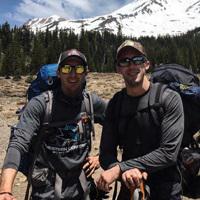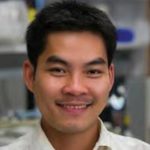Heroes
Stuart Connelly
 Liver Life Champion
Liver Life Champion
Around the time of my 26th birthday in April 2015, I was diagnosed with primary sclerosing cholangitis (PSC). Not the kind of birthday gift I had in mind.
PSC is a little known autoimmune disease that affects the bile ducts both outside and inside the liver. It causes scar tissue to build up and prevents the liver from functioning properly. Currently, there is no cure and no treatment. PSC patients usually face liver disease and transplant issues within a 10-year time frame from diagnosis.
Nothing prepares anyone for this. After a few trips to the ER, which led to a great gastroenterologist, I found a fantastic hepatologist who is involved directly in PSC research.
Then I joined the San Francisco Bay Area division of the American Liver Foundation, and within weeks of my diagnosis, I signed up to climb Mt. Shasta, the second largest volcano in America.
When I started, I was weeks behind the other climbers in doing practice hikes, physical training and recruiting donors to sponsor my ALF Liver Life Climb. But that didn’t stop me. I reconnected with my inner Boy Scout and trained in the short time I had to be able to handle a two-day climb carrying a 40-pound pack.
The many lessons I have learned throughout life have taught me to think clearly, stay positive and take action when faced with adversity. For me, part of that action has been raising my voice by being part of the ALF Liver Life Climb.
I know my efforts increased PSC awareness and provided research funds for the American Liver Foundation. I am proud to serve as the Liver Life Champion for the 2016 climb team so that together we can move forward toward our goal of a world without liver disease. I will continue to work with ALF for this cause so that others like myself will hopefully have a treatment and a cure someday soon.
 Carolyn Evans
Carolyn Evans
PBC Patient & Volunteer Counselor
I have lived with primary biliary cholangitis (PBC) since 1992 when I was 32. I was a young mother. I had two kids, my dad had recently died, and I had a bad cold that would just not clear up. I was so exhausted. Ultimately I was diagnosed with PBC. In 2006, I received a living donor transplant and have just celebrated my 10th year post transplant!
I feel that I have learned a lot that can help others, especially the newly diagnosed and their family members. ALF provides so much support to people living with liver disease and valuable forums for patient education, so I have been an active volunteer with ALF for over two years. In January, as part of its series of patient education webinars, I joined Dr. Cynthia Levy, a nationally-known hepatologist, to give people an opportunity online to ask the medical and personal questions that are keeping them awake at night. It was amazing. Hundreds of people logged on to hear what I had to say, and it was my honor to share my experiences with them.
Through ALF, I also meet with other PBC patients one-on-one to talk about living with the disease. For example, when I was first diagnosed, I was told that I would not be able to have another child. I didn’t feel my family was complete yet, and I didn’t want to accept that. I was able to find doctors who could guide me to a healthy pregnancy, and today I have a wonderful son who has been healthy for more than 21 years. So when I met with a woman who had been diagnosed with PBC and had also been told she would never be able to have children – I was able to give her renewed hope. I shared ALF resources about managing PBC, treatment protocols and child bearing information and encouraged her to explore the options for pregnancy with her doctor.
With education and support, PBC patients can have a full life. I tell people, don’t live in the past and don’t fear the future. Take your life one day at a time and enjoy every minute of it.
 Dr. Doan Doa
Dr. Doan Doa
ALF Postdoctoral Research Fellowship
I have worked in the area of hepatitis B virus (HBV) infection from basic research to clinical science and patient care as well as outreach/advocacy programs for more than 9 years. I have family members who are infected with Hep B, and liver disease is epidemic is my home country of Vietnam and highly prevalent in the Asian American community here. So this is personal for me.
But honestly, when I moved to the U.S. from Vietnam when I was 18, I had no idea about the dimensions of this public health crisis. When I decided to become a doctor, I took two years off from medical school to do research and became increasingly aware of the complexity of liver disease, as well as the unmet needs for treatment and support in America and in Southeast Asia.
As a scientist, I am extremely engaged by the complexity of the disease itself, and very grateful for the Fellowship support that I received from ALF to continue my research into Hep B. We need better ways to conduct animal research on mice, and I am part of a large group of scientists around the world who are tackling these barriers at the genetic level, so that we can make faster progress in understanding the disease and developing treatment.
Part of the problem is that liver disease research is underfunded, given how many people suffer with it and how deadly it can be. Because the disease progresses more slowly than something like a heart attack, the threat of the disease doesn’t seem as imminent. That is a mistaken perception that must be reversed.
Scientific progress is essential but so is building awareness and community. At the local level in Texas, at the national level here, and in my home country of Vietnam I am trying to bring people together to raise awareness and provide more of a medical and community infrastructure for disease education and support. I believe the liver disease community needs to be increasingly vocal to advocate for policy changes and funding. ALF is a tremendous inspiration, and I am committed to raise my voice with ALF.
Last Updated on May 20, 2020
Share this page






